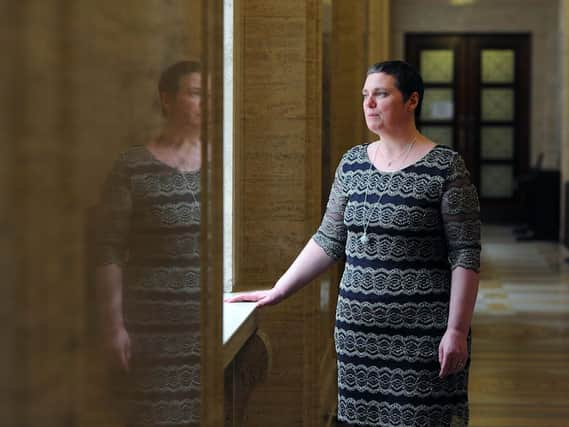IRA victim: '˜I'll never back SDLP if it agrees to SF pact'


Ann Travers, who said she has backed the SDLP in the past, told the News Letter she is “sickened” by the notion of a pact with the paramilitary-connected party, and urged SDLP members to imagine what their original founders would make of the idea.
Meanwhile Ulster Unionist stalwart Lord Kilclooney said that the SDLP would simply be “destroying themselves” by joining with Sinn Fein.
Advertisement
Hide AdAdvertisement
Hide AdThey were speaking following the suggestion during the week by SDLP leader Colum Eastwood that he is interested in crafting together some kind of anti-Brexit axis ahead of the June 8 General Election.
He stressed that it would not be a “sectarian” pact among nationalists – but the biggest anti-Brexit party by far is Sinn Fein, and it signalled its interest during the week, whereas non-aligned anti-Brexit party Alliance has explicitly rejected joining a pact.
Last night the SDLP issued a statement stressing once more that its idea of a pact is based solely on a shared opposition to Brexit, adding that it also wants pro-EU unionists to join.
Ms Travers believes the SDLP can “forget” the idea of unionist voters offering transfer votes to the SDLP in the future following Mr Eastwood’s controversial plan.
Advertisement
Hide AdAdvertisement
Hide AdMs Travers, whose sister Mary was shot to death by the IRA in 1984, said: “I’d be really disappointed with the SDLP if they did enter into a pact with a political party that still justifies murders that the IRA committed.
“I’ve always seen the SDLP as having the moral high ground.
“It’s always deeply saddened me and I couldn’t understand why in the last election nationalists aren’t voting for the SDLP; I don’t know why they’re turning towards a party that still justifies murder.”
If the SDLP were now to go ahead and cut some kind of electoral deal with Sinn Fein, she said: “I think it certainly will undermine them. I don’t see how any decent, law-abiding nationalist could give them their vote.
“If the SDLP enter into a pact with Sinn Fein, I think it’s disgusting and I really would be quite horrified.”
Advertisement
Hide AdAdvertisement
Hide AdMs Travers, 47, has lived in the Republic for over a decade, though said she had previously been a supporter of the SDLP during her time in Northern Ireland.
However, she “absolutely could not support them ever again if they entered into anything like that – and I’d imagine that I wouldn’t be alone”.
SDLP ‘CAN SAY GOODBYE TO UNIONIST TRANSFERS’
The book ‘Lost Lives’ recounts that Ms Travers’ sister Mary (a 22-year-old Catholic schoolteacher) died on April 8, 1984, after being shot while leaving Mass in south Belfast.
Her father Tom Travers (a magistrate) was shot repeatedly but survived – and later said an attempt had also been made to shoot his wife too as she cradled Mary, but that the gun misfired.
Advertisement
Hide AdAdvertisement
Hide AdMs Travers came to prominence in 2011 when she spoke out publicly over the fact one of the murder gang – Mary McArdle – had been appointed as a highly-paid special advisor to Sinn Fein.
Ms Travers said she is still contacted daily by relatives of Troubles victims, who recount their own traumatic experiences to her.
When quizzed about the pact plans, SDLP members and Green Party leader Steven Agnew (whose party may also join) have told the News Letter that Sinn Fein have a democratic mandate in the Province and that they already deal with its members regularly at Stormont and elsewhere.
“That’s completely different,” said Ms Travers.
“Having to work with people because they’ve been elected and are in a ‘work colleague’ situation is completely different from entering into a pact with them so that they can get votes.
Advertisement
Hide AdAdvertisement
Hide Ad“There are unionist voters who would have given a second vote to the SDLP. But the SDLP might as well just forget about any of that now.
“And actually I’d ask them to look back at what their forefathers and people who started their political party would actually think of that.”
She contrasted that idea with the rejection of violence she said had characterised the emergence of the party during the civil rights era.